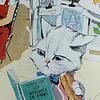Take a photo of a barcode or cover
Reviews tagging 'Violence'
El nombre del viento / The Name Of The Wind: Primer dia / Day One by Patrick Rothfuss, Patrick Rothfuss
94 reviews
Will I read the sequel: likely but not a priority since the third book hasn't come out yet.
Moderate: Addiction, Animal death, Body horror, Bullying, Death, Drug abuse, Gore, Misogyny, Physical abuse, Sexism, Violence, Blood, Police brutality, Medical content, Grief, Death of parent, Murder, Injury/Injury detail, Classism
Graphic: Violence, Grief, Death of parent
Graphic: Death, Violence, Grief, Death of parent
Moderate: Bullying, Alcohol
Minor: Fire/Fire injury
Kvothe is a fantasy Mary Sue dipped in tragedy and rolled in musical genius. He’s a prodigy at everything: music, magic, sympathy, storytelling, ego, even street survival. I kept waiting for him to show a flaw that wasn’t just “I’m too amazing for this cruel world.” The supporting cast is charming but dangerously close to archetype territory. Denna, the romantic interest, is the worst offender—she’s the “manic mystery girl” turned up to eleven. She exists solely to frustrate Kvothe and by extension, me. Ambrose is cartoonishly villainous, Elodin is a riddle machine, and Bast is weirdly underutilized despite being literally a Fae with secrets. There’s charm, sure, but nuance? Not always.
The world is immersive, but not always alive. The University has its Hogwarts moments, but the rest of the world fades into hazy vagueness unless it’s directly relevant to Kvothe’s personal saga. Tarbean, for example, is described as bleak and soul-crushing, but Rothfuss speeds through it like he’s late for a better plotline. The Waystone Inn has some real melancholy weight, but we hardly spend time there. The world wants to be sprawling and rich, but too often it feels like a well-decorated stage waiting for Kvothe to strut on.
Okay, fine—this is still Rothfuss’s strongest suit. The man can write. But sometimes it’s too polished. Like he’s performing rather than telling a story. I often felt the prose was in love with itself, lingering on moments not because they mattered, but because they sounded pretty. The pacing suffers for it. I caught myself skimming beautifully constructed sentences because they weren’t doing anything new. It’s like eating gourmet chocolate cake every page—eventually, I just wanted a damn sandwich. Still, he’s got rhythm, humor, and poetic chops. Just… maybe chill with the mirror-gazing, Pat.
This is where the shine starts to crack. For a 600+ page tome, shockingly little actually happens. Kvothe’s childhood, his street urchin phase, his time at the University—they’re all interesting in theory, but the plot meanders like a drunk philosopher. Rothfuss teases the Chandrian like they’re the looming threat of the century and then… nothing. There’s no central conflict with teeth, no momentum. It’s more memoir than epic. A gorgeous, glacially-paced, self-important memoir. And don’t get me started on the ending—it’s not an ending, it’s just a pause with a dramatic sigh.
I was interested. Not obsessed. There are tantalizing mysteries—Denna’s patron, the Chandrian, Kvothe’s future downfall—but Rothfuss holds back so much that it starts to feel less like suspense and more like narrative blue-balling. I wanted revelations, and instead I got more cryptic hints wrapped in flowery anecdotes. I kept reading, sure, but more out of stubborn hope than genuine suspense.
The magic system is cleverly constructed, but the consistency of the world’s logic takes a backseat to Kvothe’s ego trip. He breaks rules and defies expectations so often it stops feeling earned. His relationships? All orbit him like sad little satellites. Denna’s arc is the worst—her motivations are cloudier than a Fae moon and her characterization is so inconsistent it feels like Rothfuss wrote her from the perspective of someone who’s never had a conversation with a real woman. The friendships at the University are more solid, but still drenched in that “Kvothe is the center of the universe” energy.
Did I enjoy it? Sure. Did I also roll my eyes roughly every twenty pages? Absolutely. This book is the literary equivalent of a brilliant but arrogant college student cornering you at a party to tell you about their Very Deep Trauma™ and how they’re writing a ballad about it. It’s undeniably beautiful in parts, occasionally moving, often funny—but also bloated, smug, and allergic to self-awareness. Would I recommend it? To the right person. Would I reread it? Only if Rothfuss ever releases book three, and even then, I’ll need wine.
Graphic: Violence, Murder
Moderate: Bullying, Child abuse, Emotional abuse, Grief, Alcohol, Classism
Minor: Cursing, Mental illness, Sexual content, Toxic relationship, Death of parent
The characters and their dynamics are complex and overall very well done and Kvothe's narration is witty. The world and magic system are original and well developed while staying quite mysterious.
I really enjoyed the contrast between story and reality, Kvothe's (unreliable) legendary image as a hero versus his humain flaws... or at least the ones he lets us see in the story he weaves for the world to see. Indeed, he himself admits that he's always used and fed the rumors about him, so in the end, isn't this story the final one he crafts ?
Moderate: Violence, Grief, Death of parent
Minor: Murder
Graphic: Child abuse, Death, Physical abuse, Racism, Violence, Blood, Medical content, Grief, Death of parent, Murder, Fire/Fire injury, Alcohol, Injury/Injury detail, Classism
Moderate: Addiction, Animal death, Bullying, Drug abuse, Drug use, Genocide, Mental illness, Misogyny, Panic attacks/disorders, Sexism, Forced institutionalization, Sexual harassment
Minor: Chronic illness, Rape, Vomit, War
i don’t like school settings and i wasn’t really prepared for us to spend 75% of this book in a school, or to encounter quite so much patriarchy. another review says the protagonist is a mary sue and i very much agree.
there’s lots of different fictional races, which i presume is why people say this cast is diverse, but it’s more like there’s russians & jews, the french & italians, the british, and romani people. as a jew, i always feel off-put by kinds of oppression/microaggressions faced by some groups in here, and by the fact that there’s a ‘money race’ for lack of a better term.
at many points the book was a chore to get through, and i was disappointed by the lack of a clean ending. also, lots of grammar/spelling/math errors in my edition?
overall i won’t be recommending it to anyone myself, but it’s a genre staple and fun to talk about with friends. definitely check the content warnings area before embarking.
Graphic: Ableism, Addiction, Animal death, Body horror, Bullying, Child abuse, Death, Gore, Mental illness, Misogyny, Physical abuse, Racism, Rape, Sexism, Sexual assault, Sexual violence, Forced institutionalization, Blood, Vomit, Police brutality, Medical content, Grief, Medical trauma, Death of parent, Murder, Schizophrenia/Psychosis , Fire/Fire injury, Abandonment, Sexual harassment, Injury/Injury detail, Classism
Minor: Addiction, Body horror, Bullying, Child abuse, Confinement, Death, Domestic abuse, Drug abuse, Drug use, Emotional abuse, Fatphobia, Gore, Mental illness, Misogyny, Physical abuse, Rape, Sexism, Sexual assault, Sexual content, Sexual violence, Suicidal thoughts, Torture, Violence, Forced institutionalization, Blood, Vomit, Police brutality, Antisemitism, Medical content, Trafficking, Grief, Medical trauma, Death of parent, Murder, Schizophrenia/Psychosis , Fire/Fire injury, Abandonment, Alcohol, Sexual harassment, War, Injury/Injury detail, Classism
Moderate: Death, Physical abuse, Violence, Police brutality, Grief, Death of parent, Fire/Fire injury, Injury/Injury detail
Minor: Cursing, Drug use, Sexual content, Forced institutionalization, Blood, Vomit, Medical content, Alcohol
Graphic: Drug abuse, Drug use, Violence
Moderate: Death of parent
Graphic: Animal death, Bullying, Child abuse, Drug abuse, Physical abuse, Violence, Blood, Medical content, Grief, Death of parent, Fire/Fire injury, Alcohol, Classism
Moderate: Ableism, Addiction, Drug use, Mental illness, Sexism, Xenophobia, Religious bigotry, Murder, Sexual harassment, Injury/Injury detail
Minor: Adult/minor relationship, Alcoholism, Body horror, Cursing, Death, Gore, Infidelity, Sexual assault, Sexual content, Forced institutionalization, Excrement, Vomit, Trafficking, Schizophrenia/Psychosis , Gaslighting, War






